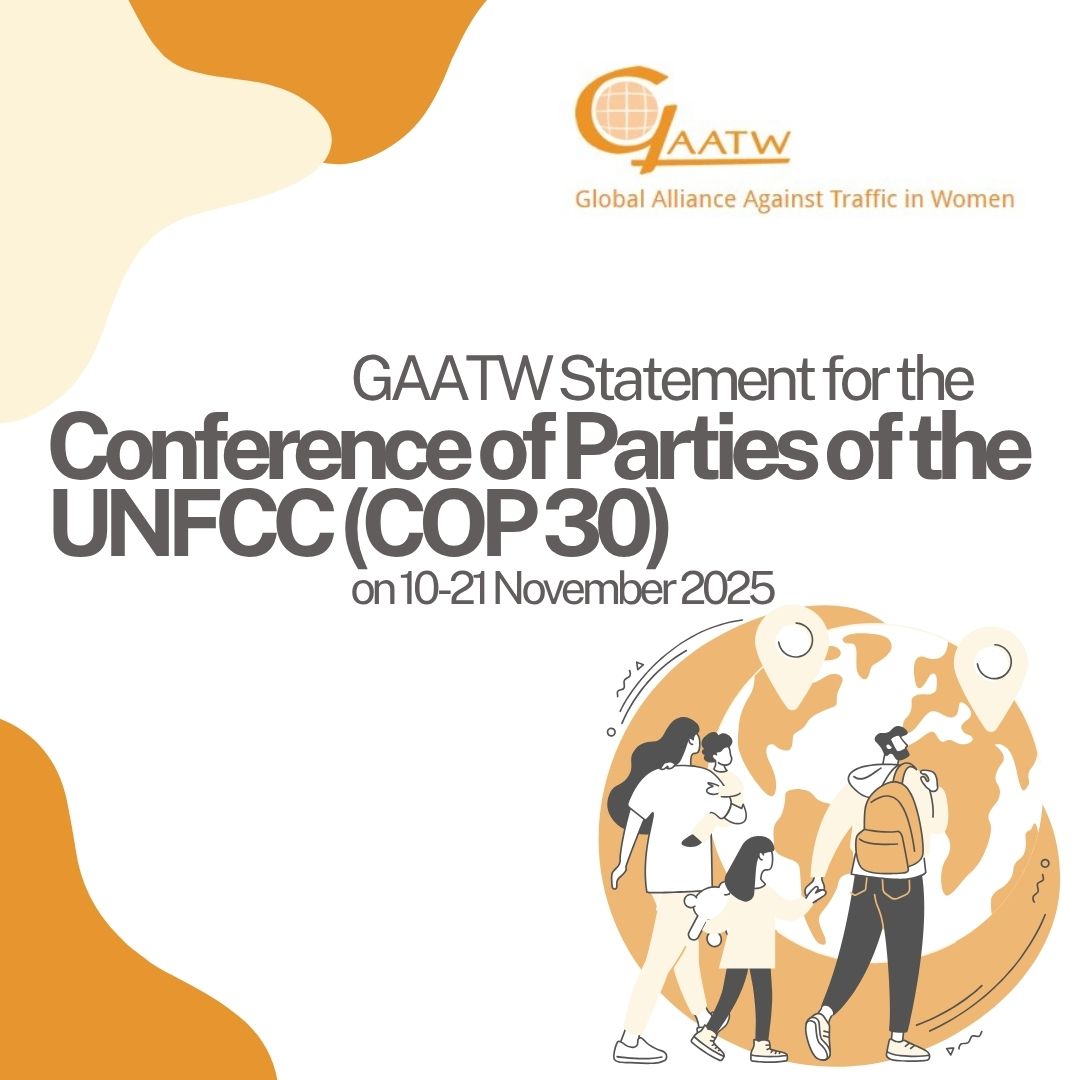COP 30 comes at a time of increasing global injustices. Genocide, escalating and unmet humanitarian needs from conflict and climate change, and persistent economic inequality are among them. We also face serious challenges to multilateralism, and the willingness of Global North countries to take their fair share of climate responsibility. However, COP being held in Brazil this year creates a sense of hope that backsliding on climate ambition can be stopped and reversed. Turning words into action for migrants and displaced people affected by climate change is a critical component of achieving a meaningful outcome in Belém.
The Global Alliance Against Traffic in Women (GAATW) is a global coalition of organisations working to support the rights of women in the context of their migration for diverse purposes, including labour and livelihood, and sees the phenomenon of human trafficking as intrinsically embedded in the context of labour migration. For many of GAATW’s members, climate change is increasingly prevalent as a driver of migration, often where migration is an adaptation strategy to a changing climate. Climate-induced migration is often a highly gendered experience, in its causes, processes and outcomes, which can reinforce existing gendered discrimination and inequalities. Climate-displaced people face a significant protection gap in international law, given the limitations of existing protection frameworks and the lack of a binding, rights-based treaty for people displaced by climate. Effective action through the United Nations Framework Convention on Climate Change (UNFCCC) processes, including the provision of climate finance and a just transition, can engage migrants and displaced people as active participants. This approach could help bridge the existing gap.
Since 2010, when climate-induced migration first entered the UNFCCC lexicon, the issue has started to become embedded in the central architecture of the negotiations. Migrants and displaced people have been included in the scope of the Fund for Responding to Loss and Damage, and while we have seen the explicit inclusion of migrants, refugees and climate vulnerable communities, in the New Collective Quantified Goal (NCQG), these groups were included without a specified target or details as to what would constitute improvement for these groups and in the ‘informal note’ of the Just Transition Work Programme (JTWP) of July this year. This is a trend which we must continue to uphold and strengthen, ensuring that words lead to tangible actions. Success at COP 30 would include seeing;
-
The creation of a Belém Action Mechanism (BAM) that transforms principles into practical action, which ensures a just transition that protects, respects and fulfils the human rights of all, including those of migrants and displaced people.
-
To this end, the JTWP’s language on migrants and displaced people should be maintained and strengthened, and there must be no dilution of these provisions in the formalisation of the JTWP and the creation of just transition plans at the national and subnational levels.
-
Just transition plans must respond to the gendered experiences of climate-displaced people, especially women and girls, in all their diversity and complexity. The interventions must progress beyond outdated stereotypes of women and girls as victims of sexual and gender-based violence, but seek to transform the legal, educational, socio-economic, health-related, and social inequalities and discriminations that underpin gendered experiences of mobility in the context of climate change.
-
This approach must also be reflected in negotiations around adaptation, in which language that around gender, indigenous and local communities, human rights, and racial and ethnic minorities is at risk of erosion and replacement with a mere reference to ‘social inclusion’. GAATW advocates for language that does not risk rendering invisible marginalised groups, including migrants and displaced people. While countries could open more regular migration pathways to support migration as a climate adaptation strategy, the right not to migrate must also be realised, including through new commitments made to adaptation finance, reaching USD 120 BN per year by 2030.
-
Success at COP will also mean finding solutions that reflect global and historical responsibility for the causes of climate change, which are in turn driving migration and displacement. This will mean the provision of new, non-debt-creating public finance to countries on the front lines of the climate crisis. GAATW supports the call of developing countries for a dedicated space to discuss Article 9.1 of the Paris Agreement on the provision of public finance. Quantified and defined outcomes for progress should be established in the context of finance goals for climate vulnerable groups including migrants, and the climate finance needs of migrants and refugees should be included in countries’ NDCs (Nationally Determined Contributions).
-
The degree to which the participation of migrants and displaced people, especially women who face greater barriers to participation in political processes, is reflected in and supported by the COP and UNFCCC processes is another litmus test of its success. Migrants and displaced people must be enabled to participate in the programmes which respond to their displacement because they are best placed to offer effective solutions, and must be recognised not as victims but as agents of change, and deserve a seat at the table.
-
The majority of people who are displaced do not cross an international border. Internally displaced people are, in comparison with cross-border migrants, scarcely discussed in international frameworks concerning migration and receive less support from the international community. Climate policy must perpetuate this gap by expressly including internally displaced people in its principles, commitments, financing and action.
GAATW welcomes that mobility has become more central in the architecture of the UNFCCC. But it is time to see words translate into action. COP 30 must serve as a platform to enhance accountability and delivery of existing commitments.

